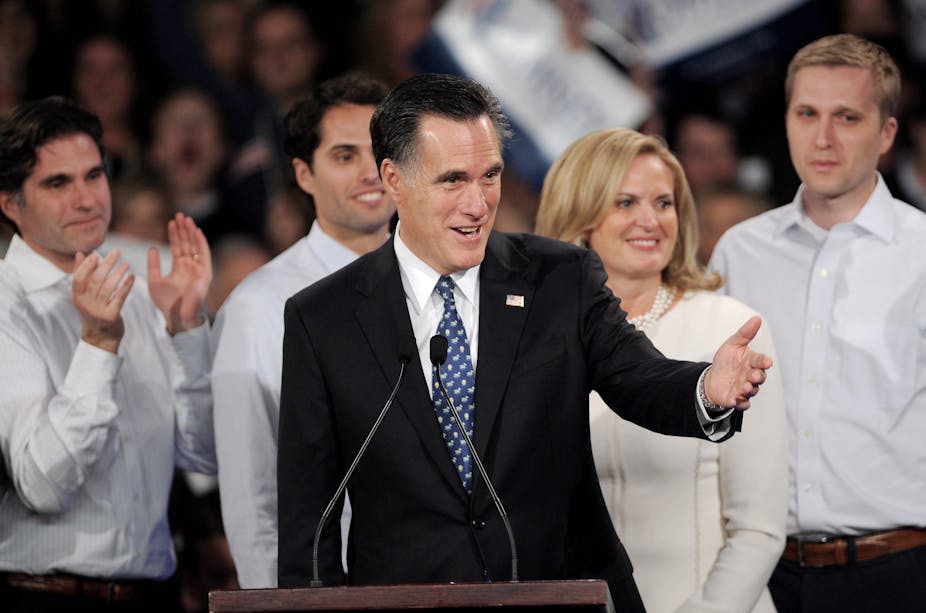In the aftermath of the New Hampshire Republican primary, former Massachusetts governor Mitt Romney has gone a long way towards securing the nomination. To be sure, he faces continued challenges from an array of ideological positions. These span the libertarian Representative Ron Paul, the moderate Jon Huntsman, the social conservative former Senator Rick Santorum, and – for lack of a coherent label – the bomb-throwing former Speaker of the House of Representatives, Newt Gingrich.
Perhaps ironically, Romney is likely to hope that his diverse array of rivals stays in the race for a while. In the American primary system, a balance-of-power logic often guides the struggles. Leading candidates are often happy to see a range of divided opponents, who undercut one another in ways that forestall any serious challenge.
This “divide and conquer” mindset has an enduring pedigree, spanning centuries domestic and international politics. Consider that in the aftermath of the Thirty Years’ War of the 17th century, French Prime Minister Cardinal Richelieu secured French power by presiding over the fragmentation of German power into a confederation made up of more than 200 separate principalities. The result was to ensure that no effective challenge would be mounted against French power – at least not until the French lost their strategic sense in the 1750s and fell prey to “imperial overstretch.”
In this sense, the Romney campaign has taken a cue from Richelieu, and is content to simply “hang back” and let its opponents undermine one another, preventing the emergence of any dominant challenger . By accounts, the Romney campaign is particularly keen to see Ron Paul – who came in second in New Hampshire – stay in the race.
Paul faces a likely “upper bound” on his ability to win in the Republican contest, particularly given his criticisms of an expansionary foreign policy. However, he does boast a devoted, youthful following, and has proved himself eager to direct fire against arguably more conventional threats in Santorum and Gingrich.
For example, in the primary debate held Saturday night in New Hampshire, Paul challenged both Gingrich and Santorum. Speaking to concerns for character, Paul criticised Gingrich for being a “chicken hawk” who had failed to fight in Vietnam. “I think people who don’t serve when they could and they get three or four or even five deferments … they have no right to send our kids off to war,” he said. Similarly, Paul denounced Santorum as a “big government” conservative who had enriched himself after losing his seat in 2006 by courting Washington lobbyists.
To the extent that Paul continues to pursue these lines of attack as the race moves to South Carolina for its upcoming primary, the Romney campaign can only be happy.
In this context, the greatest danger for the Romney campaign is that its varied rivals will coalesce around a single line of attack. To some degree, that may be occurring in the context of attacks on Romney for the activities of his former venture capital firm Bain Capital, which presided over a series of corporate restructurings – or, in less polite terms, mass lay-offs.
In one South Carolina appearance, Texas Governor Rick Perry called Romney a “vulture capitalist”. He said that “venture capitalism is a good thing, comes in, gives that gap funding to help these companies get off and get started creating jobs, and work. But Mitt Romney and Bain Capital were involved with what I call vulture capitalism. And they walked into [South Carolina firm] Gaffney and took over that photo album company for no other reason than to basically pick the bones clean. And those people lost their jobs.” Similarly, a political action committee supporting Gingrich plans to air a documentary critical of Romney and Bain over the week prior to the South Carolina.
However, even here, divisions may emerge, as Romney supporter and former New Hampshire governor John Sununu suggested that such Republican critics were advancing a “socialist” line. Even conservative radio host Rush Limbaugh has suggested that such criticisms may go too far. In this sense, Romney’s critics may continue to inadvertently aid him, as the absence of a single challenger hastens his march to the nomination.

